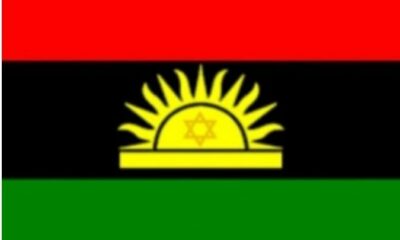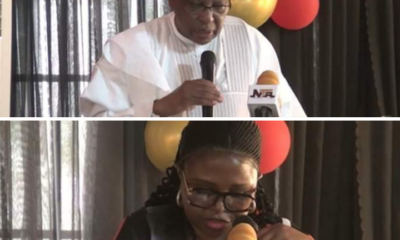GRBusiness
The Opportunity Cost of Doing Business for SMEs in Africa


The African economy has gathered momentum over the years, with an estimated increase of 3.8% of the real output growth in 2017. As the largest economies gradually strengthen, the 2018/2019 performance should reach 4.1% according to the African Development Bank.
This economic growth and sustainable development have largely been contributed by Small and Medium Enterprises (SMEs). In Kenya for instance, SMEs contribute approximately 40% to the GDP and employ over half of the country’s workforce.
Yet, becoming a profitable SME in the continent is never a smooth sail for many. There’s the presence of stringent government regulations in several countries, though the flexibility of doing business in others is a force to be reckoned with. The World Bank has recognized Kenya as having implemented the most reforms in the region between June 2016 and June 2017. These include the reduction of the number of procedures required to register a business, as well as utilizing a single window system to reduce the time for import documentary compliance. Then there’s the implementation of iTax, an online platform that allows Kenyans to easily register their businesses, fill and pay corporate income tax among others.
Moreover, access to credit remains one of the biggest hindrances for SMEs in Africa to thrive. The major banks are mainly huddled in big cities, making it difficult for a predominant section of businesses in rural areas to access formal financial services.
Besides, there exist rigorous risk assessment requirements by financial institutions that tend to limit the number of businesses that can access credit. These requirements include but are not limited to collateral, which often proves cumbersome to acquire even when trying to access short-term credit or simply, is non-existent.
According to Juan Seco, the Chief Operating Officer of JumiaPay, “Non-collateral loans are on the other hand quite expensive for most SMEs in Africa, with an Annual Percentage Rate (APR) that can go as high as 300% in Kenya and 240% in Nigeria.” The Central Bank of Nigeria records about 69 percent of SMEs who wanted to apply for loans but failed, due to fear of application rejection related to collateral requirements and other associated conditions attached to the loan approval processes such as bad scores.
Notably, the entry of Fintechs (Financial Technology) companies into the banking market in Africa, is gradually improving the process of accessing credit for SMEs. Jumia is one of the companies revolutionizing the sector with its Jumia Lending service, an initiative that provides working capital financing for short-term borrowers. These are vendors selling on the online ecommerce platform for at least six months, seeking to expand and grow their online business. The program aims at boosting financial inclusion in the continent, not only by providing sellers with an online visibility and a vast customer base; but also, with access to affordable working capital to boost their commerce.
Juan Seco notes that “we understand the challenges faced by our vendors and SMEs in general, to access working capital financing. We have, therefore, also partnered with some of the best institutions where we try to bridge the gap for sellers seeking long-term credit facilities. With Jumia being in the middle, our lending partners have the security that the data of our sellers on Jumia, such as sales or customer ratings is accurate. In addition, we give them first lien on the sales on Jumia, so even though these are not collateralized loans, they are highly de-risked as we give them some control over the sellers’ cash flows. For our sellers, we understand they cannot afford to spend hours in
traffic and at the branch, so we digitize the onboarding process, so they can keep running their shops and not lose valuable income”.
Currently applicable in Kenya and Nigeria, and soon to be launched in other countries where Jumia has operations, the Lending Program involves a quick online registration process with feedback provided within 72 hours. Vendor applicants benefit from low-interest rates of as low as 12% per annum, on the non-collateral loans with flexible repayment plans of between 1- 6 months.
“I am on the second loan and the process of paying back is quite efficient and flexible since you get to plan your instalment deposits and manage it by yourself. I have managed to grow my business capital and gotten higher returns. When I lost funds and communicated the same to the lending team, they gave me a grace period to recover; a benefit that is not available on other lending facilities,” says Nauri Mwei, a vendor on Jumia.
The impression fintechs such as Jumia Lending are leaving on credit consumers and especially SMEs in Africa, is that of value added to their businesses. They are bridging a long-existing gap in financial inclusion in relations to credit access, by providing a more transparent and seamless way of availing financial services to a wider range of consumers in the continent.
Credit: Josephine Wawira
Finance
EFCC Chairman Tasks Nigerian Youths Against Crimes And Fraudulent Acts


The Chairman of Economic Finance Crime Commission (EFCC), Ola Olukoyede, has stressed the need for Nigerian Youth to see themselves as agents of positive change that have a lot to contribute to the socioeconomic development of the Nation.
Speaking at the 2nd edition of a Leadership Trainings Programme in Abuja, Olukoyede, who was represented by the Head Enlightenment and Re-orientation unit, (EFCC), Aisha Mohammed, said the commission’s dream is to see the youth contribute meaningfully to the society, emphasizing on the need to work together in bringing positive change to society.
The Economic and Financial Crimes Commission Boss declared the readiness of his agency to work with all Stakeholders, including the youth towards changing the narrative and reposition the country to greater exploit.
Also speaking, the representative of the Executive Secretary of Tertiary Education Trust Fund (TETFUND), Sonny Echono, appealed to the youths is to eschew social vices that could deter their full potential in life.
Other speakers at the event, including the Chairperson, Zero Tolerance for Social Immoralities Initiative (ZEITI) Africa, Rasak Jeje called on all stakeholders to join hands in collective pursuit of empowering new generation of leaders to curb the rising tides of social Vice among Nigerian youths.
The Chairperson, Zero Tolerance for Social Immoralities Initiative (ZEITI) Africa, Rasak Jeje made the call while addressing journalists at the 2nd edition of it Leadership Trainings Programme in Abuja on Thursday.
He said the training was aimed to intimate students leaders with knowledge and insights that will help them drive positive change and become exemplary leaders in their respective spheres.
Finance
AISA Has Refunded The Fees Paid By Yahaya Bello To EFCC


The Economic and Financial Crimes Commission (EFCC) says the American International School Abuja (AISA) has refunded the fees paid by the immediate past governor of Kogi state, Yahaya Bello, for his children attending the school.
In response to a letter addressed to the Lagos zonal commander of the EFCC, the school said $845,852 was paid in tuition “since the 7th of September 2021 to date”.
AISA said the sum to be refunded is $760,910 because it had deducted educational services already rendered.
“Please forward to us an official written request, with the authentic banking details of the EFCC, for the refund of the above-mentioned funds as previously indicated as part of your investigation into the alleged money laundering activities by the Bello family.
Since the 7th September 2021 to date, $845,852.84 (Eight Hundred and Forty-Five Thousand, Eight Hundred and Fifty Two US Dollars and eighty four cents) in tuition and other fees has been deposited into our Bank account.
We have calculated the net amount to be transferred and refunded to the State, after deducting the educational services rendered as $760,910.84. (Seven Hundred and Sixty Thousand, Nine Hundred and Ten US Dollars and Eighty Four cents).
No further additional fees are expected in respect of tuition as the students’ fees have now been settled until they graduate from ASIA.”
In a chat with The Cable, the spokesperson of the EFCC, Dele Oyewale, confirmed that the school has refunded the money.
‘’The money has been paid into public account,” Dele Oyewale was quoted as saying
Finance
Godwin Emefiele Disobeyed Direction Of Law With Intent To Harm The Public, He Printed ₦684.5M Using ₦18.9B Says EFCC in fresh charge


The Economic and Financial Crimes Commission has filed a fresh charge at the High Court of the Federal Capital Territory against the embattled former governor of the Central Bank of Nigeria, Godwin Emefiele.
EFCC in the charge accused Emefiele of approving the printing of N684,590,000 at the rate of N18.96 billion.
EFCC also alleged that Emefiele broke the law with intent to harm the public during his implementation of the naira swap policy of the administration of former President Muhammadu Buhari.
The anti-graft agency also accused Emefiele of unlawfully approving the withdrawal of N124.8 billion from the Consolidated Revenue Fund of the Federation.
EFCC’s top prosecutor, Rotimi Oyedepo, SAN revealed that Emefiele will be arraigned on a new four-count charge before Justice Hamza Muazu
Counts one to four of the charge, read,
“STATEMENT OF OFFENCE: Public Servant disobeying direction of law with intent to cause injury to the public contrary to and punishable under Section 123 of the Penal Code Law, Cap. 89 Laws of the Federation, 1990.
“PARTICULARS OF THE OFFENCE: That you GODWIN IFEANYI EMEFIELE between the 19th day of October 2022 and 5th March 2023 in Abuja, knowingly disobeyed the direction of Section 19 of the CBN Act, 2007, by approving the printing of N375,520,000.00 pieces of colour swapped N1, 000, at the total cost of N11,052, 068,062 without the recommendation of the Board of Central Bank and the strict approval of the President, Federal Republic of Nigeria which conduct of yours caused injury to the public and you thereby committed an offence.”
This and three other charges were stated against him. They read;
“COUNT 2: “That you, GODWIN IFEANYI EMEFIELE, between the 19th of October 2022 and 5th March 2023 in Abuja, knowingly disobeyed the direction of Section 19 of the Central Bank of Nigeria Act, 2007, by approving the printing of 172,000,000 pieces of colour swapped N500 (Five Hundred Naira) Notes, at the total cost of N4, 471,066,040 without the recommendation of the Board of Central Bank and the strict approval of the President, Federal Republic of Nigeria which conduct of yours caused injury to the public and you thereby committed an offence.
“COUNT 3: “That you GODWIN IFEANYI EMEFIELE between the 19th day of October 2022 and 5th March 2023 in Abuja, knowingly disobeyed the direction of Section 19 of the CBN Act, 2007, by approving the printing of 137,070,000 pieces of colour swapped N200 (Two Hundred Naira) Note, at the total cost of N3, 441, 005, 280 without the recommendation of the Board of Central Bank and the strict approval of the President, Federal Republic of Nigeria which conduct of yours caused injury to the public and you thereby committed an offence.”
“COUNT 4: “That you, GODWIN IFEANYI EMEFIELE, on or about the 7th day of October 2020, in Abuja, within the jurisdiction of this Honorable Court, knowingly disobeyed the direction of Section 80 of the Constitution of the Federal Republic of Nigeria, 1999 (As Amended), by approving the withdrawal of the total sum of N124, 860, 227, 865.16 from the Consolidated Revenue Fund of the Federation in a manner not prescribed by the National Assembly, which conduct of yours caused injury to the public and you thereby committed an offence.”
-



 News4 days ago
News4 days agoNigerians Seek Woman Who Spoke Out Eloquently Against Fuel Scarcity In Viral 1994 TV Clip
-



 News3 days ago
News3 days agoAnambra State Government Arrests Man For Marrying Off His Underage Daughter
-



 News3 days ago
News3 days agoIPOB Declares May 30th As Sit-at-home Day Across The Southern East States To Honour Biafran Fallen Heroes
-



 Education2 days ago
Education2 days agoFederal Government Sets To Commence School-To-Work Scheme
-



 News1 day ago
News1 day agoLady Dies After Friends Pushed Her Into Boiling Pot Of Fresh Pepper In Delta State
-



 Finance1 day ago
Finance1 day agoEFCC Chairman Tasks Nigerian Youths Against Crimes And Fraudulent Acts






